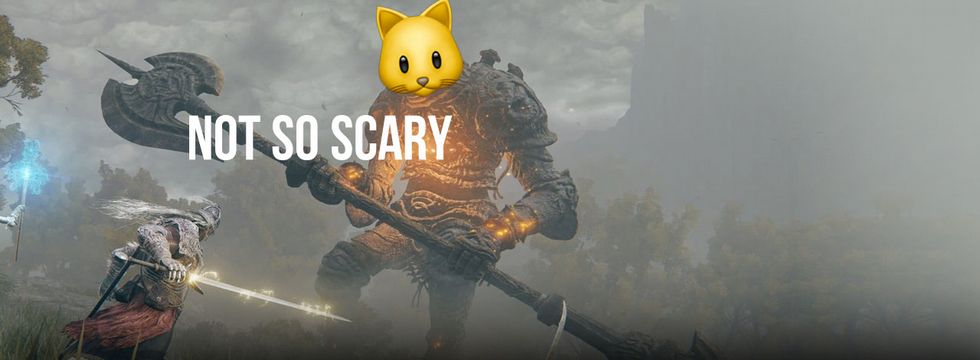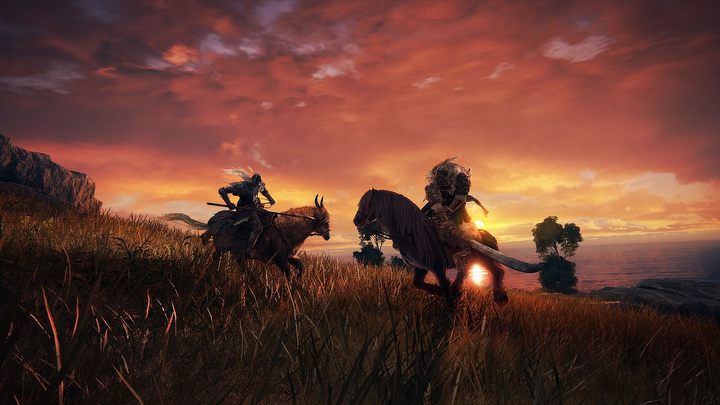Not as frustrating. How Elden Ring became a cute soulslike

Not as frustrating
The Elden Ring no longer offers the sort of "keep-hitting-that-wall-untill-it-cracks" experience and challenge. By giving players the freedom, the game not only offers alternatives in case of running into a stalemate, but also empowers the player by significantly expanding the number of feasible solutions, and encourages other ways of spending time. Can't cope with a story boss? Never mind, you can always go elsewhere and spend hours before making another attempt. You will certainly not run out of content. There's a gigantic open world here, filled with secrets, many of which will noticeably strengthen your character and properly prepare you to face the most difficult of enemies.
This time, FromSoftware had a much better idea when it comes to scalling up the challenge. In addition to story bosses, there are plenty of additional, bigger enemies and, of course, dozens of mobs – from harmless to reasonably powerful. As a result, it constantly feels like you're making some progress. For the first time when playing a FromSoftware game, it doesn't feel like the protagonist's presence in the world is punishment; the vibe is much more adventurous, and our immortality is more of an asset than a curse. Instead of struggling for hours with a single boss, you can just do something else. The game also curbs the need to grind souls/runes required to level up your character because there are numerous other ways to buff your character up – simply by exploring other corners of the beautiful and captivating land.
Another factor that helps keep frustration in check are the places of grace. There are many more of these than in previous games – I was really surprised by their density. In addition, there are also additional checkpoints, the Stakes of Marika, that are activated automatically and let you to respawn even closer to the place where you have fallen. Recovering lost runes is thus much safer.
To a large extent, you can also forget about repeating long passages of each stage. Most of the bosses are surrounded by grace areas, which eliminates the tiring backtracking and allows you to start the next fight practically instantly, as well as focus fully on the challenge at hand. People who are less patient and have less time to play will certainly appreciate this. They should also welcome the trails of light that suggest the location of further places of grace. In terms of the story, it is impossible to get lost.
The Elden Ring also offers a slew of minor changes, resulting not only from the openness of the world. These include the ability to use raw materials to craft items and ammunition that used to require valuable souls in previous games. There are also other, quality-of-life improvements that make combat smoother and again translate into less frustration, caused by, for example, broken mechanics. The number of deaths caused by lousy hitboxes or accidental dying due to failed jumps over large chasms – the button dedicated to jumping is a real game changer!
Take care to listen, I can help you endure the difficulties
Okay, you probably get the picture of a game that was made easier, and retained its unique level of challenge. Yes, The Elden Ring is still difficult, although much more accessible, and, at times, calmer. You can stop being afraid. Where the game plans to crush the player to the ground, it will certainly do so. Inevitable death is still a key element of the game. The fictional bosses are just one example, but in the open world, we are faced with many threats that at first attempts seem insurmountable! The Elden Ring still requires reflexes, composure and, above all, learning. And so it remains a difficult game – just a bit more fair, and less stressful.
You have to remember that the introduced simplifications won't really be useful if the player doesn't learn the rules. It's still a game with a unique pacing, and just because the nature of the experience, you cannot complete it in one fell swoop. The ballet of death combining dashes, dodges, blows and combos has to be mastered. Souls and the Elden Ring require the player to adapt to their style. Thus, they stand in opposition to the most mainstream games, which follows the path of adapting to particular groups of consumers. FromSoftware, despite being open to a wider group of players, still requires them to change their habits and be humble. The creators are aware of the target audience they want to reach. They do not so much change their idea of a target audience, but simply invite more people to join the fun. I think they have succeeded in this very difficult task that countless other creators have faced – the art of finding the perfect balance between accessibility and maintaining the classic spirit and identity of a series that's famous for its high degree of challenge. And they did so in an exceptional way.


